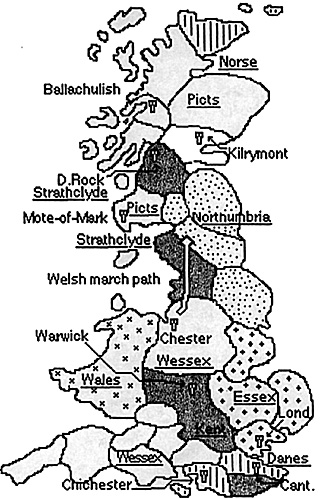 After five and a half years of warfare, the battlefields of Britain were silent. Tattooed Pict and mailed Briton no longer raided each other incessantly, Vikings halted their harrying of Britain's windswept shores, and the Anglo-Saxon kingdoms ceased their strife for preeminence. Who had lost?
After five and a half years of warfare, the battlefields of Britain were silent. Tattooed Pict and mailed Briton no longer raided each other incessantly, Vikings halted their harrying of Britain's windswept shores, and the Anglo-Saxon kingdoms ceased their strife for preeminence. Who had lost?
In the Bretwalda campaign, all the players were losers, of a sort, for our longest-running campaign had finally drawn to a close. Some players had been lured away, but my productivity as GM had slackened to processing turns every three or four months instead of bimonthly, at its height. Over the next couple issues, I will recount each kingdom's successes and woes, and analyze their strategies.
Wessex
 In the history books, Wessex "won" the struggle for domination of Britain. Wessex was as close to a winner as Bretwalda produced. Wessex began strong, though -- controlling 6 provinces producing 23 income points each year and possessing an army of 18 detachments (The largest permitted army, for example, a "Great Host" was composed of seven detachments). Wessex's forces managed to retain control of all its original provinces and nab two new ones from Mercia (Hwicce and Elmet). Wessex finished the campaign controlling 8 provinces producing 32 income points. Its army boasted 26 detachments.
In the history books, Wessex "won" the struggle for domination of Britain. Wessex was as close to a winner as Bretwalda produced. Wessex began strong, though -- controlling 6 provinces producing 23 income points each year and possessing an army of 18 detachments (The largest permitted army, for example, a "Great Host" was composed of seven detachments). Wessex's forces managed to retain control of all its original provinces and nab two new ones from Mercia (Hwicce and Elmet). Wessex finished the campaign controlling 8 provinces producing 32 income points. Its army boasted 26 detachments.
King Egbert, played by Larry Connor, adopted a policy of slow, steady growth. Along with its allies Kent/Sussex and Essex, Wessex formed the "Saxon Alliance," which lasted almost until the campaign's end. Wessex wielded its large army in a few "big fists," preferring to sacrifice territory covered for security. The fists were used mainly to pummel northern neighbor Mercia into extinction. Later in the campaign, Wessex's armies were kept hopping to fend off frequent Viking incursions, and to come to the aid of its ally Kent/Sussex, which it did loyally.
King Egbert's slow and steady growth strategy was a success. Wessex finished the campaign in excellent shape for future expansion.
Picts
Historically, the Pictish kingdom was a "loser," being absorbed by the Scots. In Bretwalda, it was far different. The Picts quickly conquered their historical nemesis, Dal Riata, then went on to drive Strathclyde to within one battle of extinction. They began in control of 4 provinces producing 18 income points per year. Their army size was 14 detachments. The Picts used this force aggressively to hold, by the end, three new provinces (Dal Riatan Hebrides and Lochalsh, and Galloway from Strath-clyde), losing only one of its originals (Orcades, to the Norse). These 6 provinces generated 30 income points and were guarded by an army of 18 detachments.
King Circinn, played by Jason Mirosavich, was a clever, aggressive campaigner. He frequently orchestrated traps for his opponents, the most famous being the complete encirclement of Strathclyde's sole army at the final Battle of Dumbarton Rock. Unfortunately, Jason lost the tabletop fight. Strathclyde slipped the noose and went on to become a thorn in King Circinn's side, defeating several Pictish armies and besieging one of his home provinces. It is Strathclyde's resurgence, along with nagging Viking incursions, that keep me from declaring the Picts the undisputed "winner." King Circinn's clever machinations and frequent sea moves meant he stayed a dangerous enemy for the other nations of northern Britain.
Essex
In number of provinces, Essex's doubling from two to four was the largest percentage increase. History saw Essex, locked in by strong neighbors, dwindle in importance. In Bretwalda, Essex was on its way to becoming a major power. Essex began with 2 provinces producing 12 income points. Its army totaled 8 detachments (less than half the size of Wessex). By the end, though, Essex's 4 provinces produced 19 points, with an army of 15 detachments.
Essex was controlled by three different people over the course of the campaign. It began under the rule of Dave Perry. When he had to drop out, as GM, I took over for awhile. The kingdom finished under the reign of Dean Veneziano. Essex was also the lucky beneficiary of the "Mercian Retirement." When that kingdom was reduced to one province (Lindsey), I secretly ruled that it would merge with the first kingdom to march on the capital. Essex was the first to do so, and King Coenwulf retired to a monastery, handing over the province and its meager remaining forces.
Under Dave, Essex fought a protracted war with Mercia, conquering the province of Saeten. Under me, it struggled with the Vikings, losing Londinium to them. Under Dean's more vigorous leadership, Essex retook Londinium, absorbed Lindsey, and cast off its allies of the Saxon Coalition. As the campaign drew to a close, war had broken out with Wessex and Kent/Sussex.
Under its various kings, Essex was an aggressive nation, steadily (if slowly) pressuring its opponents. It ended the campaign much more powerful, but at war with a stronger enemy. Perhaps with allies or good fortune on the battlefield, it could have prevailed. If not, then struggles would be ahead for this upstart kingdom.
More Bretwalda
Winter 816 A.D.
Spring 817 A.D.
Summer 817 A.D.
Autumn 817 A.D.
Winter 817-818 A.D.
March and April 818 A.D.
May and June 818 A.D.
Who Won? Part 1
Who Won? Part 2
Who Won? Part 3
Back to The Herald 33 Table of Contents
Back to The Herald List of Issues
Back to MagWeb Master Magazine List
© Copyright 2000 by HMGS-GL.
This article appears in MagWeb (Magazine Web) on the Internet World Wide Web. Other military history articles and gaming articles are available at http://www.magweb.com